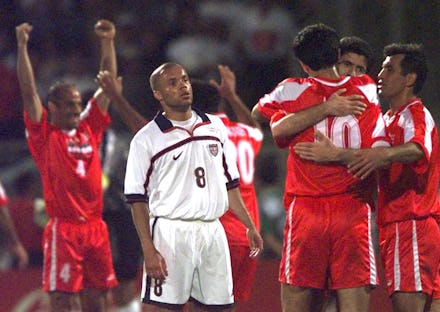The 5 Most Politically Charged Soccer Matches in World Cup History

More than any other sport, soccer is intertwined with politics. At the World Cup, nations that don't get along, have checkered histories or have recently been at war can get pitted against eachother in the arena.
With the world watching, a game between two political rivals could become explosive. Imagine if, for example, Russia wins Group H and the USA finishes second in Group G. This would set up a second-round game at a time when the diplomatic relationship between the two countries is at its lowest point since the collapse of the USSR.
Here are five World Cup games that were fuelled by political tension.
1. United States vs. Iran, 1998
Since the Iranian revolution in 1979, the relationship between Tehran and Washington was difficult and often outright hostile. So when the two countries were drawn together at the 1998 World Cup, this game had to be handled with care.
And despite some incidents that could have made things difficult, such as Iran's Supreme Leader Ali Khamenei giving orders that the Iranian players should not walk towards the Americans for the pre-match handshakes, the tension surrounding the game highlighted soccer's ability to transcend politics. Each Iranian player handed a bouquet of flowers to his American counterpart, and the two No.11's posed for a joint team photo. And the result — a 2-1 Iranian win — eliminated the U.S. from the tournament.
2. England vs. Argentina, 1986
In April 1982, Argentina invaded the British-held Falkland Islands, which are just 300 miles from the Argentinian coast. It was a large-scale conflict, lasting over two months and costing more than 900 lives on both sides.
Four years later, England and Argentina were thrown together in a World Cup quarterfinal in Mexico. The wounds from the Falklands War were still raw. Diego Maradona has since said that the Argentine players went into the game thinking about how "a lot of our boys had died, shot down like little birds." This sense of vengeance inspired him and his team to a 2-1 win, which included both Maradona's greatest moment of sheer genius and his most brazen act of skullduggery.
The debate over the Falklands' future won't go away, either: The Argentina squad posed with a poster asserting the country's right to the territory before its World Cup warm-up game against Slovenia.
3. West Germany vs. East Germany, 1974
During the Cold War and the decades in which Germany was forcibly separated into two countries, the democratic West Germany (three World Cup wins, three-time runners-up) was far more successful than the communist East. In fact, East Germany (GDR) only managed to qualify for the World Cup once, in 1974, when the tournament was held in — you guessed it — West Germany.
It was a peculiar tournament. The powers of England, France, Spain and Portugal all failed to qualify, so the European spots were taken by communist countries like Poland, Yugoslavia, Bulgaria and East Germany, which was naturally drawn in the same group as its capitalist neighbor.
Both teams were already assured of a place in the next round before the game, which was the last of the first group phase. However, it was still a symbolic occasion. In contrast to the professional atheletes from West Germany, East Germans held regular jobs. Some East Germans supported the other side, and only 1,500 specially selected GDR fans were allowed to make the train journey to Hamburg to watch the match. The result was a shock 1-0 win for the East Germans, but the West had the last laugh, defeating the Netherlands in the final to win its second World Cup.
4. Angola vs. Portugal, 2006
Before independence in 1975, Angolans had lived under Portuguese colonial rule for almost 500 years. The two countries have a difficult relationship, mixed with mutual bitterness and resentment. These feelings boiled over during an insanely violent "friendly" in 2001. The match was abandoned in the 67th minute after Angola picked up its fourth red card, with the score 5-1, Portugal.
Five years later, they were drawn in the same group at the 2006 World Cup, and the Angolans had the chance to bring their former masters down with the whole world watching. But an early goal from Pedro Pauleta took the sting out of Angola, and the game stayed at 1-0. Both teams managed to finish with 11 players.
5. Argentina vs. Holland, 1978
In 1978, the World Cup was held in Argentina, which was then controlled by a military dictatorship. The team, which featured talismanic striker Mario Kempes, reached the final to face the Netherlands (which had considered boycotting the tournament because of Argentina's leadership) after a campaign that included a 6-0 win over Peru, which has been the subject of match-fixing speculation ever since.
But the final was a hugely political affair, and Argentina's 3-1 win gave the junta a huge propaganda victory, causing a wave of nationalistic celebration across the country. But it did much to cover up some of the regime's atrocities, and a soccer game commemorating the junta's victims was played in 2008, 30 years after the 1978 final.